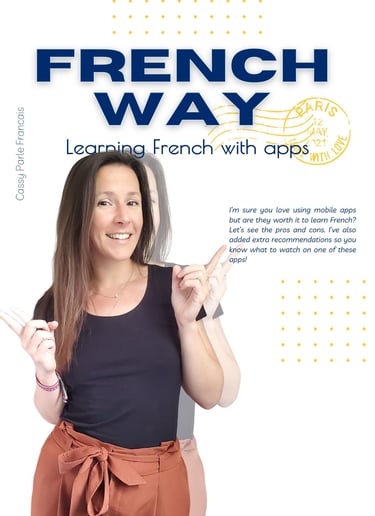I try 5 apps to learn FRENCH : are they worth it?
There are so many mobile apps that pretend they will teach you French. But can you truly learn French with these 5 apps? Are they even worth it? I test them for you and let you know what I think as a French tutor.
4/28/20254 min read
With dozens of language learning apps floating around, you might be wondering which ones are actually worth your time. Spoiler alert: not all apps are created equal.
In this article, I’m breaking down five popular French learning apps—I’ve tested them myself, and I’m sharing my honest take on the pros, the cons, and who they’re really for. And if you want a clean summary, including all the pros and cons? I made a free PDF for you (link in the description if you’re coming from my YouTube video).
Let’s dive in with the first one:
1. Memrise – Great For Real-Life Vocabulary (Until It Gets Boring)
This app was actually recommended by one of my students, and I’ve tested it myself too. Let’s talk about what works and what doesn’t.
✅ What I love:
Real video content featuring native speakers. You get to hear real French accents, and not just one overly polished voice.
It offers literal translations—for example, showing you that “J’ai faim” literally means “I have hunger,” which helps you understand how French really works.
It uses spaced repetition, which is scientifically proven to help with memorization.
❌ What’s not so great:
It can get repetitive, and let’s be honest—boring—pretty quickly.
Some of the AI-generated sentences feel a bit off or overly formal (“nobody says that” moments).
It motivates gently, but the game-like feel wears off if you're not super into repetition-based learning.
My verdict:
Good for a boost in vocabulary and practicing real-life expressions, especially for beginners. But if you get bored easily (like I do), it might not keep you hooked long-term.
2. FluentU – Immersive, Contextual Learning (Great for Visual Learners)
I was introduced to FluentU when they became the first sponsor of my channel. I hadn’t tested it before, but I’m so glad I did. This app does things differently than the others.
✅ What I love:
The immersion-based approach is on point. It teaches you using real-world videos like YouTube clips and TV shows. This is ideal for people who want to hear French in context, not just memorize random sentences.
After watching videos, you can review words and sentences with a deck, helping reinforce what you’ve learned.
It makes you repeat and engage actively, which is key for retention. You can also add words to your personalized deck as you go.
❌ What’s not so great:
Some of the vocabulary might be a bit advanced for absolute beginners, especially if you’re starting with the basics.
It can be overwhelming to juggle videos and vocabulary at the same time.
Ads and paid features can get a bit in the way of the user experience if you’re using the free version.
My verdict:
This app is great for learners who want to immerse themselves in real French content and are okay with a bit of advanced vocabulary. If you like learning via video, FluentU could be your new best friend.
Want to give Fluent U a try?
Do you want to try Fluent U with a 40% discount? Fluent U's team made it possible for my audience!
https://link.fluentu.com/cassy-parle-francais
3. Duolingo – Fun for Beginners, But It’s More of a Game Than a Learning Tool
You’ve probably heard of Duolingo—the cute owl mascot is hard to miss. This app is super popular, but let’s take a closer look.
✅ What I love:
Gamified lessons make it fun and interactive. You’re constantly rewarded with points, badges, and streaks.
Quick and easy lessons that don’t take up too much time. It’s easy to squeeze in a 5-minute lesson during your day.
It covers all the basics—grammar, vocabulary, and speaking practice.
❌ What’s not so great:
The sentences often feel unnatural or overly formal (you’ll end up saying things like “The cat eats the book”).
It doesn’t always explain why certain things are the way they are in French.
Limited real-world context—you won’t be able to have a real conversation using just Duolingo. It’s more about memorizing isolated pieces of information.
My verdict:
Great for absolute beginners looking for a fun, low-pressure way to get started. If you want something more serious or immersive, you might want to look elsewhere after a few weeks.
4. Lingodeer – Great Structure, But Lacking in Speaking Practice
Lingodeer is gaining popularity, and for good reason. This app is known for its highly structured approach to learning.
✅ What I love:
It’s structured and systematic, which makes it great for learners who need clear progressions.
Grammar explanations are solid, and it goes deeper into language rules, which helps if you’re serious about learning.
The lesson variety is nice—matching words, sentence construction, and comprehension exercises all in one.
❌ What’s not so great:
It lacks speaking practice, which means you might not feel ready to speak French outside of the app.
It can sometimes feel too academic for those looking for a fun, interactive learning experience.
My verdict:
Lingodeer is perfect for learners who like structure and want a deeper understanding of French grammar. But if you’re looking to practice speaking and real-world conversations, it might not be the best fit.
5. Mondly – Good for Daily Practice, But Don’t Expect Deep Learning
Mondly is another well-known app, but does it hold up? Let’s see.
✅ What I love:
Daily lessons keep you on track and motivated with short bursts of practice.
The interactive features—like voice recognition for speaking practice—are nice touches.
Visual learning aids help reinforce vocabulary, and there’s a decent range of topics to explore.
❌ What’s not so great:
The grammar explanations are basic and don’t always help with deeper understanding.
It’s a bit repetitive and can feel like you’re just memorizing phrases without truly understanding them.
The speaking recognition feature can be a bit buggy and not very accurate.
It's ugly to the eye, I really cannot oversee that.
My verdict:
Mondly is a good app for daily practice, but it’s best used for reinforcement rather than deep learning. If you want to build a solid foundation or prepare for real conversations, you may need something more in-depth.
5 French Learning Apps Reviewed by a French Tutor (The Good, the Meh & the Boring)



Get 40% off of your FluentU subscription and have fun learning French: https://link.fluentu.com/cassy-parle-francais
SUBSCRIBE
Learn more, get updates and stay connected
Subscribe my VIP's Newsletter 💌
